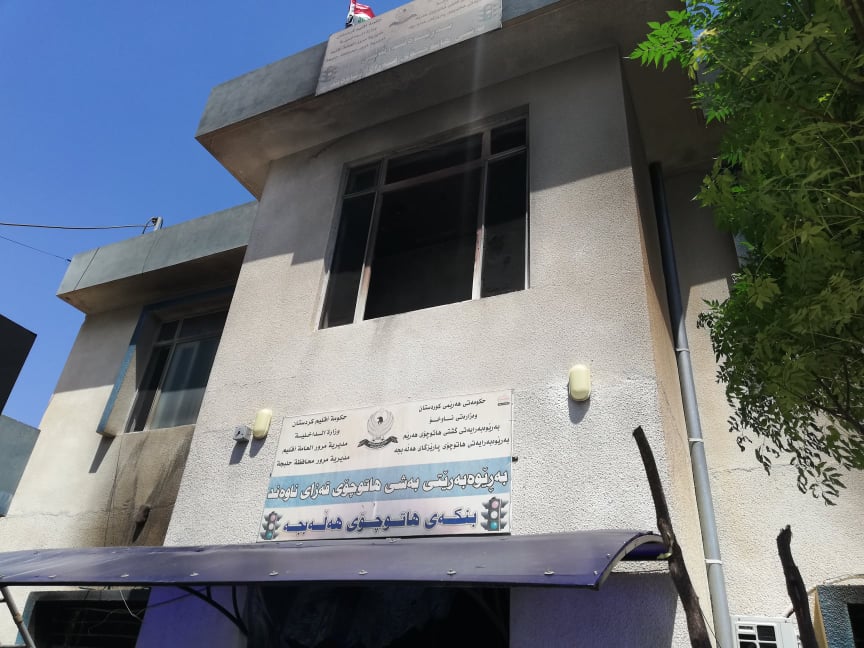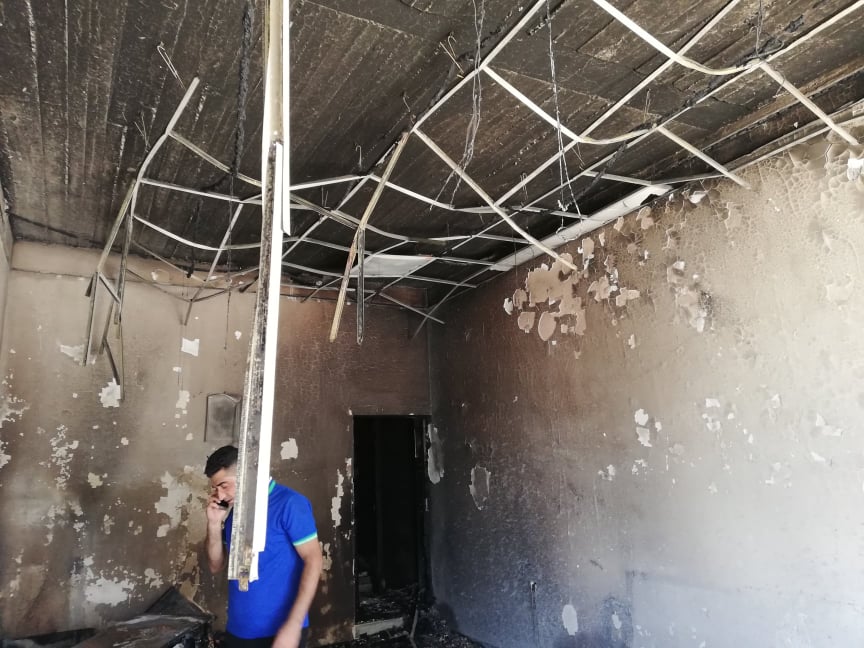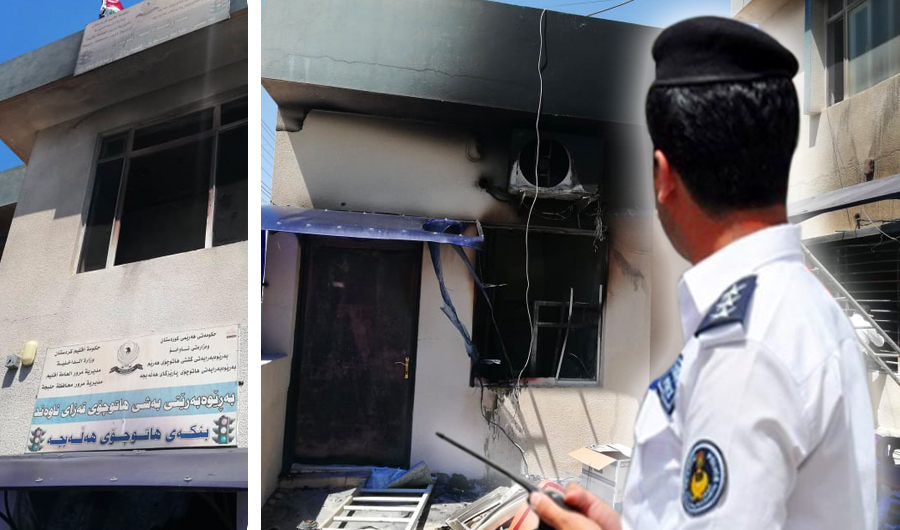On a sweltering August afternoon in Halabja, dozens of people gathered at a dilapidated roundabout in the city to protest. Their objective was making the Kurdistan Regional Government (KRG) retract the policy of slashing civil servants' salaries and paying them on time. The protest ended later that day, but the day didn't end with that; later that night, several places were burned down.
At around 10 PM on 22 August, the number of the youths streaming out of the streets and alleys into the centre of Halabja was steadily increasing. They started with chanting and burning tires on the streets, and ended with pelting and then burning down four buildings belonging to the authorities and political parties.
Thousands of municipality documents were destroyed in a suspicious act of arson.
Earlier that day, employees and teachers organized a peaceful demonstration at Omar Khawar roundabout at the centre of the city, to protest against the slashing of 21% of their salaries by the Kurdistan Regional Government. The demonstration ended by sunset and did not lead to any violent incidents.
It started near the municipality building
The municipality building of Halabja was the first government office to be pelted with stones by the youths. According to activists in the city, the youths tried to enter the building, but they were repelled by police.

Nwenar Jawhar, one of the activists in Halabja, said: “After they were prevented [from entering the office], at 11:30 they gathered in front of the mayor’s office. First, they threw rocks at the building, then they entered and set it on fire.”
“After that, they headed towards the police station, which is near KDP’s [headquarters in Halabja] Branch 12 building,” Jawhar added.
Jawhar described the protestors as poor, unemployed and angry, some of whom he knew, but not the organizers.
The protestors later set fire on the Traffic Police building, then headed towards KDP headquarters.
They reach the KDP headquarters after midnight. The guards of the building fire in the air, over the heads of the protestors.
I noticed that the youths became angrier by the gunfire. Their chants against the government and political parties increased
Nwenar added: “I noticed that the youths became angrier by the gunfire. Their chants against the government and political parties increased.
A number of armed men (believed to belong to KDP) enter the KDP headquarters and security forces spread around the building.
Jawhar, who was among the protestors, continued: “Rocks were being thrown and tires were set on fire. Thousands of bullets were coming down on us.
Later, security forces disperse the crowd by spraying a substance with a “unpleasant odor.”
Around 2 AM, the youths go back home and the KDP headquarters remains intact.

A day later, Halabja Police confirmed that stones were thrown at the mayor’s office, the court building, PUK headquarters, and KDP headquarters. But Basam Ali, director of KDP’s headquarters, said during a press conference that the KDP was the only political party that was targeted that night.
Basam Ali added: “We remained self-constraint. At the beginning shots were fired by someone on a motorcycle. I reminded my colleagues to remain self-constraint, and to not fire back. At 12 midnight, an armed attack on the headquarters took place from all 4 sides. They came very close to the entrances, that’s why we were compelled to instruct the guards to fire over the protestors in order to disperse them.”
No one was injured during the protests.
The police station of the city centre is inside the mayor’s building, that’s the reason they remained safe. But there were only a few guards at the traffic police station and only one guard at the municipality building.
There are [usually] only three guards at the municipality building at nighttime. That night there was only one guard
Kwestan Akram, head of municipality, told KirkukNow: “There are [usually] only three guards at the municipality building at nighttime. That night there was only one guard. What can a guard do?”
An eyewitness whose resident is near KDP headquarters, said that the protestors were mainly young people and that some teenagers were amongst them.
The mystery of the bunt documents
Two rooms of the municipality building containing important documents were set on fire. One contained planning documents, and the other archives.
The archives room is located at the ground level. It contained more than 30 years of documents related to land and real estate ownerships.
No digital backup had been made of the destoryed documents. “There was no digital system in previous years. There was no databse we could enter those documents into. We also didn’t have [enough] emplyees,” Kwestan Akram added.
There is controversy around part of the destroyed documents.
Under the previous administration of Halabja, 730 plots of land in the industrial area had been distributed. 109 of them were handled without issues, but 621 of them were subject to controversy and were sent to the Public Prosecutor in Sulaymaniya by the administration.
Another controversy involves granting political party cadres and officials 4500 plots of land, along with 10 projects for which land was provided by the municipality without having proper permits.
A number of journalists and activists in Halabja claim that the burning of the archives at the municipality was “preplanned,” to cover up the corruption involving the granting of land plots.
Rebaz Kamal, head of Stance Group (which had previously revealed corruption issues), told KirkukNow: “The two rooms that were set on fire are not next to one another: the planning room is at the front of the building, the other is the files archives located at the back of the building. This and the lack of a sufficient number of guards at the building raise suspicions.”
The Stance Group submitted all the evidence they had gathered to the courts. Kamal added: “The corruption is not only committed by individuals; political parties are involved too.”
Khidir comes back from the graveyard
In june 2015, the Administration of Sulaymaniya Province withdrew confidence in Khidir Karim, the former head of Halabja municipality, and he was prosecuted.
The committee ordered the withdrawal of confidence in Khidir Karim. But later, under orders from Nechirvan Barzani (former KRG prime minister and currently president of KRG), the order was reduced to a warning
“The Ministerial Council set a committee to investigate the case. The committee ordered the withdrawal of confidence in Khidir Karim. But later, under orders from Nechirvan Barzani (former KRG prime minister and currently president of KRG), the order was reduced to a warning,” said Rebaz Kamal.
One day after the documents were burnt, Khidir Karim disappeared. Two days later, he was found at a graveyard in Halabja. The police said he was in bad health conditions when he was found. But neither the police, nor Karim’s family want to talk more about the incident.
Jawhar, the activist, doesn’t think the burning was preplanned. “Trust me, the youths in Halabja are extremely disappointed; these political parties have marginalized and humiliated them.”
Kwestan Akram also sees no controversy around the issue, and said: “Even if it’s true, it has been done in a very inept manner. If [the burnt documents] are related to land ownership, there are documents on such things in other institutions as well.”
The Municipality of Halabja has filed a legal complaint against the protestors, and the police have taken footage from surveillance cameras to determine the identity of the protestors.
Due to the incident, all work at the government institutions was halted.
Authorities in Halabja estimate the damage to be about 110 million Dinars (about $90,000).
Halabja demands more than becoming a province
Halabja became a province in 2014, successive cabinets Halabja made countless promises to Halabja, but the lack of job opportunities and basic services have only helped discontent among residents to rise.
More than 150 projects have been halted.
The Halabja province has about 103,000 residents. 70,000 of them reside in Halabja City.
Each year, 200 to 300 families leave Halabja due to lack of services and job opportunities. Most of them go to Sulaymaniya.
The Federal Government in Baghdad has so far not officially recognized Halabja as a province.





